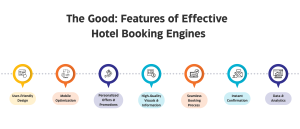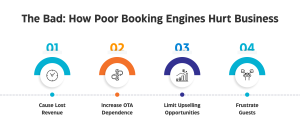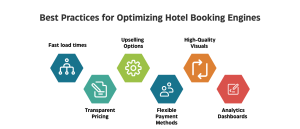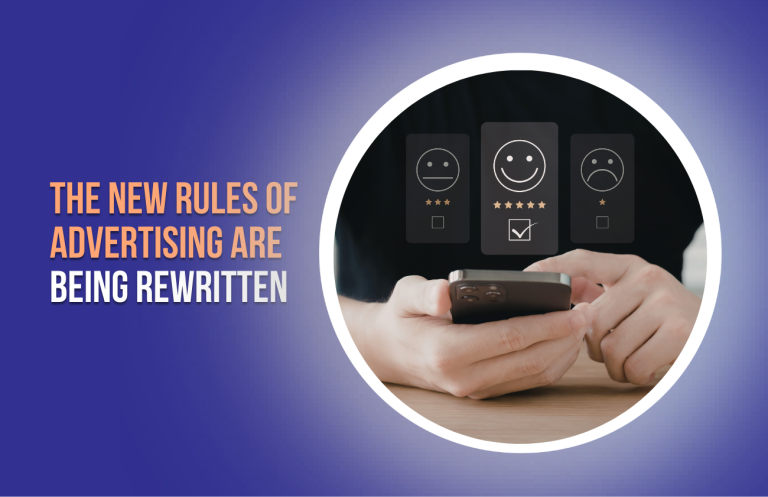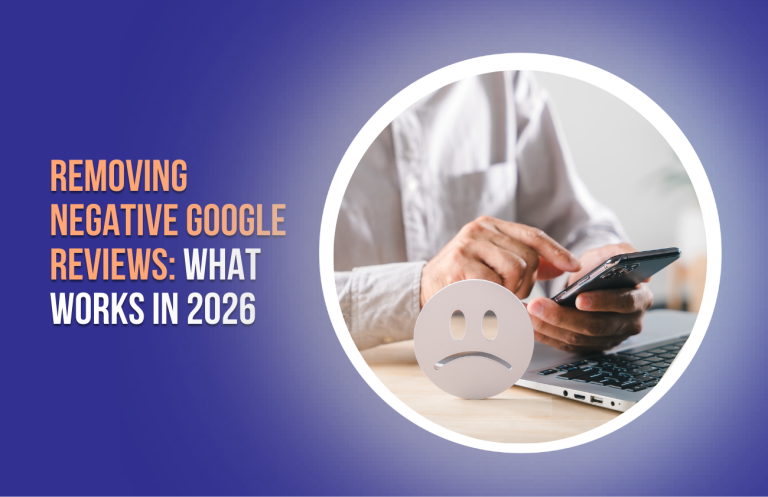A hotel booking engine is an online tool that allows guests to search, view, and reserve rooms directly through a hotel’s website. By connecting with the hotel’s Property Management System (PMS), it displays live availability, pricing, and room details, making it simple for travelers to complete secure reservations without needing to call or email the property.
This technology plays a vital role in helping hotels streamline the booking process, reduce reliance on Online Travel Agencies (OTAs) such as Booking.com, Expedia, or Airbnb, and improve guest satisfaction. At the same time, not all booking engines are created equal—some elevate the guest experience and drive revenue growth, while others create barriers that result in lost bookings and unhappy customers.
In this guide, we’ll explore the good, the bad, and the ugly of hotel booking engines—highlighting key features to look for, pitfalls to avoid, and strategies to ensure your system works for both your business and your guests.
Why Hotel Booking Engines Are Essential for Direct Bookings
A hotel booking engine is more than just reservation software—it’s the digital gateway between travelers and a hotel’s direct sales channel. Instead of relying solely on Online Travel Agencies (OTAs), a booking engine allows guests to book directly on a hotel’s website with features such as:
- Real-time availability – Guests can instantly see which rooms are open for their desired dates.
- Transparent pricing – Room rates, taxes, and fees are clearly displayed without any surprises.
- Easy comparisons – Travelers can view and choose from different room types and packages.
- Secure reservations – Bookings are confirmed instantly with safe payment options.
For hotels, the advantages are just as significant:
- Reduced OTA commissions, keeping more revenue in-house.
- Greater brand control, showcasing rooms and amenities the way the hotel wants.
- Upselling opportunities, from room upgrades to add-ons like breakfast or spa treatments.
- Stronger guest relationships, since bookings happen directly on the hotel’s own platform.
When designed well, a booking engine doesn’t just manage reservations—it elevates the guest experience, increases profitability, and reduces dependency on third parties.
The Good: Features of Effective Hotel Booking Engines
The best hotel booking engines are designed with both the guest and the hotel in mind. Key features include:
- User-Friendly Design – Simple navigation, clear room descriptions, and a minimal number of steps to complete a booking.
- Mobile Optimization – With a growing share of reservations happening on mobile devices, a mobile-first interface is essential.
- Personalized Offers & Promotions – Dynamic pricing, discount codes, and exclusive packages encourage direct bookings.
- High-Quality Visuals & Information – Clear property photos, detailed amenities, and transparent policies improve trust and conversions.
- Seamless Booking Process – Options like multi-room reservations, upsells (late checkout, spa packages, tours), and multiple payment methods reduce friction.
- Instant Confirmation – Automated confirmations via email or SMS give guests peace of mind.
- Data & Analytics – Integration with PMS and Google Analytics helps hoteliers track performance and guest behavior.
When all these elements align, booking engines not only improve guest satisfaction but also maximize hotel revenue per booking.
The Bad: How Poor Booking Engines Hurt Business
Not all booking engines are created equal. A poorly designed system can:
- Cause Lost Revenue – Complicated processes, limited payment options, or slow-loading pages often push guests to abandon bookings.
- Increase OTA Dependence – Without a reliable booking engine, hotels may end up paying higher OTA commissions.
- Limit Upselling Opportunities – Missing features like add-ons or upgrades reduce revenue potential.
- Frustrate Guests – If the system is clunky, confusing, or lacks transparency, guests may leave negative reviews and choose competitors instead.
In short, a weak booking engine directly impacts conversion rates, profitability, and brand reputation.
The Ugly: Operational and Customer Service Challenges
Beyond revenue, poor booking engines create operational headaches:
- Overbookings & Errors – Without proper PMS integration, staff may need to manually reconcile reservations, leading to mistakes.
- Extra Administrative Work – Manual data entry wastes staff time and increases the chance of inconsistencies.
- Poor Data Quality – Inaccurate or incomplete guest information makes it harder to personalize communications or build loyalty.
- Guest Dissatisfaction – Delays, booking errors, or unclear cancellation policies lead to complaints and lost repeat business.
The ripple effect can be significant—turning technology meant to save time and moneyinto a source of stress.
Best Practices for Optimizing Hotel Booking Engines
Hotels can maximize results by following these best practices:
- Ensure fast load times and a smooth mobile experience.
- Offer transparent pricing with no hidden fees.
- Integrate upselling options to increase revenue per guest.
- Provide flexible payment methods (credit cards, PayPal, digital wallets).
- Use high-quality visuals and accurate room descriptions.
- Track performance with analytics dashboards to identify drop-off points and improve conversions.
By treating the booking engine as a revenue-generating tool, not just a technical add-on, hotels can stay competitive in a crowded market.
The Future of Hotel Booking Engines: Trends and Innovations
The next wave of booking engine development is focused on personalization, automation, and guest empowerment. Trends include:
- AI-Powered Recommendations – Tailoring room packages and add-ons based on guest behavior.
- Voice Search & Smart Assistants – Enabling bookings through Alexa, Siri, and Google Assistant.
- Seamless Multi-Channel Integration – Syncing bookings across hotel websites, social media, and messaging apps.
- Dynamic Pricing – Real-time rate adjustments based on demand and competitor data.
- Enhanced Security – Stronger encryption and secure payment options to boost guest trust.
Hotels that embrace these innovations will be better positioned to attract direct bookings and build guest loyalty.
The Reputation Lab: Supporting Hotels with Online Reputation Management
While technology like booking engines is essential, a hotel’s online reputation is equally critical in driving direct reservations.
That’s where The Reputation Lab comes in. As a consulting agency specializing in review response services, we:
- Monitor and respond to reviews on platforms like TripAdvisor, Google, Yelp, OTAs, and more.
- Provide data-driven reporting to highlight trends in guest feedback.
- Offer best practices for hotels, restaurants, and service-based businesses looking to elevate their reputation.
A great booking engine brings guests in—but a strong online reputation keeps them coming back.


